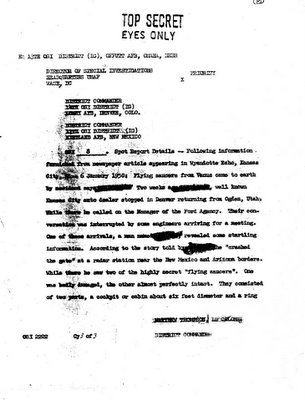
U.S. Reclassifies Many Documents in Secret Review
By Scott Shane
The New York Times
2-21-06
WASHINGTON, Feb. 20 — In a seven-year-old secret program at the National Archives, intelligence agencies have been removing from public access thousands of historical documents that were available for years, including some already published by the State Department and others photocopied years ago by private historians.By Scott Shane
The New York Times
2-21-06
The restoration of classified status to more than 55,000 previously declassified pages began in 1999, when the Central Intelligence Agency and five other agencies objected to what they saw as a hasty release of sensitive information after a 1995 declassification order signed by President Bill Clinton. It accelerated after the Bush administration took office and especially after the 2001 terrorist attacks, according to archives records.
But because the reclassification program is itself shrouded in secrecy — governed by a still-classified memorandum that prohibits the National Archives even from saying which agencies are involved — it continued virtually without outside notice until December. That was when an intelligence historian, Matthew M. Aid, noticed that dozens of documents he had copied years ago had been withdrawn from the archives' open shelves.
Mr. Aid was struck by what seemed to him the innocuous contents of the documents — mostly decades-old State Department reports from the Korean War and the early cold war. He found that eight reclassified documents had been previously published in the State Department's history series, "Foreign Relations of the United States."
"The stuff they pulled should never have been removed," he said. "Some of it is mundane, and some of it is outright ridiculous."
After Mr. Aid and other historians complained, the archives' Information Security Oversight Office, which oversees government classification, began an audit of the reclassification program, said J. William Leonard, director of the office.
Mr. Leonard said he ordered the audit after reviewing 16 withdrawn documents and concluding that none should be secret.
"If those sample records were removed because somebody thought they were classified, I'm shocked and disappointed," Mr. Leonard said in an interview. "It just boggles the mind."
If Mr. Leonard finds that documents are being wrongly reclassified, his office could not unilaterally release them. But as the chief adviser to the White House on classification, he could urge a reversal or a revision of the reclassification program.
A group of historians, including representatives of the National Coalition for History and the Society of Historians of American Foreign Relations, wrote to Mr. Leonard on Friday to express concern about the reclassification program, which they believe has blocked access to some material at the presidential libraries as well as at the archives.
Among the 50 withdrawn documents that Mr. Aid found in his own files is a 1948 memorandum on a C.I.A. scheme to float balloons over countries behind the Iron Curtain and drop propaganda leaflets. It was reclassified in 2001 even though it had been published by the State Department in 1996.
Another historian, William Burr, found a dozen documents he had copied years ago whose reclassification he considers "silly," including a 1962 telegram from George F. Kennan, then ambassador to Yugoslavia, containing an English translation of a Belgrade newspaper article on China's nuclear weapons program.
Under existing guidelines, government documents are supposed to be declassified after 25 years unless there is particular reason to keep them secret. While some of the choices made by the security reviewers at the archives are baffling, others seem guided by an old bureaucratic reflex: to cover up embarrassments, even if they occurred a half-century ago.
One reclassified document in Mr. Aid's files, for instance, gives the C.I.A.'s assessment on Oct. 12, 1950, that Chinese intervention in the Korean War was "not probable in 1950." Just two weeks later, on Oct. 27, some 300,000 Chinese troops crossed into Korea.
Mr. Aid said he believed that because of the reclassification program, some of the contents of his 22 file cabinets might technically place him in violation of the Espionage Act, a circumstance that could be shared by scores of other historians. But no effort has been made to retrieve copies of reclassified documents, and it is not clear how they all could even be located.
More . . .
See Also: UFO Files Held From Public Because of Abestos?
Home
No comments :
Post a Comment
Dear Reader/Contributor,
Your input is greatly appreciated, and coveted; however, blatant mis-use of this site's bandwidth will not be tolerated (e.g., SPAM, non-related links, etc).
Additionally, healthy debate is invited; however, ad hominem and or vitriolic attacks will not be published, nor will "anonymous" criticisms. Please keep your arguments/comments to the issues and subject matter of this article and present them with civility and proper decorum. -FW